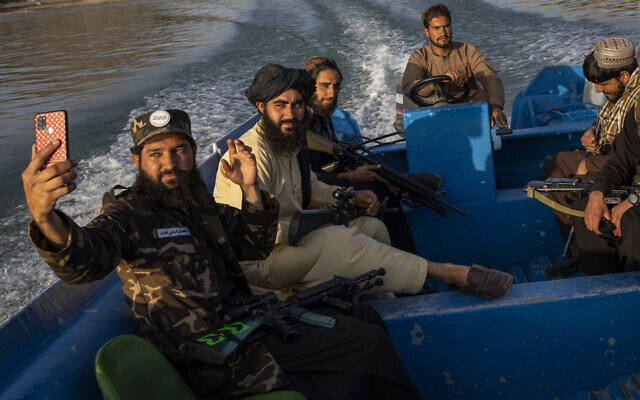Published:September 29, 2021
-The Times Of Israel
Afghanistan’s new defense minister has chastised junior Taliban fighters for “damaging” the Islamist group’s status by taking selfies, wearing stylish clothes, sightseeing and generally having too much fun.
Since the Taliban took over the country on August 15, its members have been observed riding bumper cars in amusement parks, touring Kabul’s zoo and enjoying a series of other attractions many of them have never encountered previously.
“Stick to the tasks you have been assigned. You are damaging our status, which has been created with the blood of our martyrs,” Defense Minister Mawlawi Yaqoob said last week, according to the Wall Street Journal.
Yaqoob, who is the son of the Taliban’s founder, argued that selfies being taken by junior members with commanders of the group could compromise the new regime’s security by giving away the leaders’ locations.
He criticized some fighters for adopting Western fashions such as shoulder-length hair, stylish clothing and trimmed beards.
“This is the behavior of the warlords and gangsters of the puppet regime,” he said, referring to the previous US-backed government, which the Taliban overthrew. “If we continue to act like this, God forbid, we will lose our Islamic system.”
This is how folks are having fun in Kabul (airport) nowadays! pic.twitter.com/WEsEXFfivw
— Afghanistan Resistance Panjshir valley 💚🇦🇫 (@afganistan6867) September 23, 2021
between Qanon and Maga people, ,corona from some crazy laboratory and seeing the Taliban (responsible for terrorist attack on Americans) Riding bumper cars, i feel like ive woken up in a real live nightmare 😳 pic.twitter.com/tyjTJ59tSN
— 𝗯𝗹𝘆6262 (@infinity6262) September 20, 2021
به لحاظ خدا!
این مردم قرار است حاکم این تمدن باشند!؟ مردم بیچاره افغانستان چه گناهی کردهاند که اینگونه جزا میبینند؟ 😭 pic.twitter.com/YXXuo0B7Gc— Abdul Qader Faqirzadah (@QaderFaqirzadah) September 22, 2021
After completing its takeover of the country, the Taliban appeared to launch a public relations blitz, telling Afghans — and the world — that life under their rule would be different this time, smiling and waving at journalists, posing for selfies in the streets and even sitting down for a TV interview with a female journalist.
But Taliban 2.0 is a hard sell. Memories of the militants’ brutal 1996-2001 regime and the near-two-decade insurgency that killed tens of thousands are etched on Afghan minds — especially women and religious minorities.
While the group is trying to show a moderate, new face, reports have emerged of fighters harassing journalists and not letting women enter universities in some parts of the country.
Images of women have been covered up or vandalized on storefronts around Kabul, and their enforcers in rural Afghanistan and smaller cities are still reportedly brutalizing people.
“They have better PR now… They can speak English, they can talk to the international media,” Pashtana Durrani, who runs a women’s education charity in the southern city of Kandahar, told Britain’s Channel 4 in an interview. “What they are saying in press conferences and what they are doing on the ground… are two different things. It’s a grave reality that they haven’t changed, they’re the same people.”




